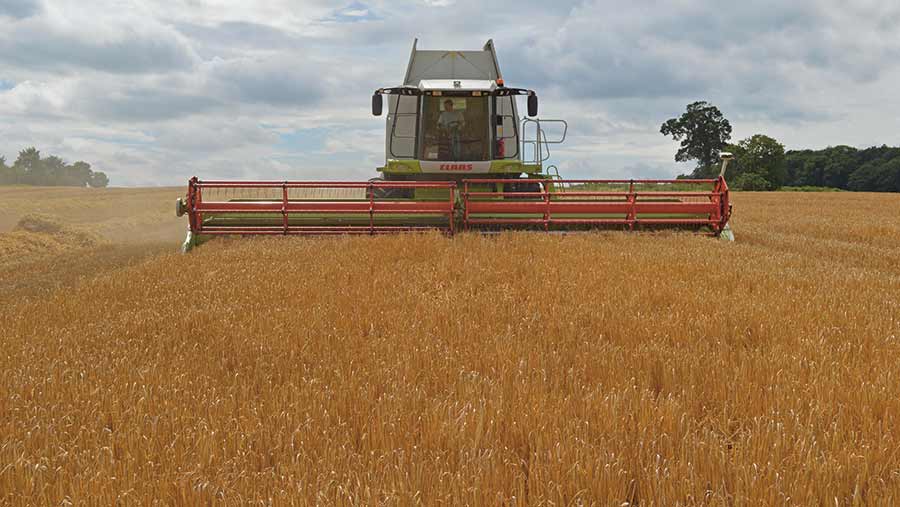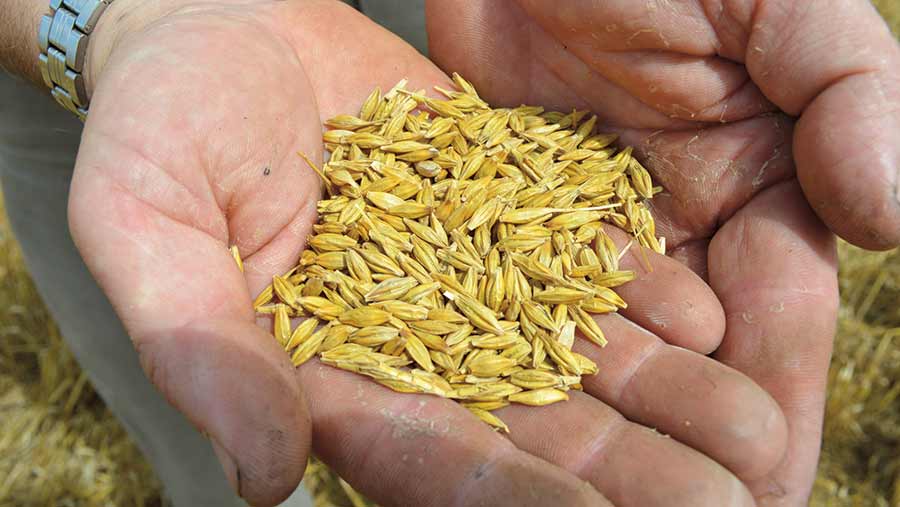Harvest 2016: Early barley yields and quality down
Low grain quality is causing concern as more winter barley crops are harvested across southern England and Ireland, while combines have also started moving into oilseed rape.
Barley crops in the East are showing reasonable yields and quality, while early harvests further west and some in the South are seeing yields and quality down on recent seasons.

Harvest is well under way in winter barley crops across the southern half of England, while the first oilseed rape crops were being cut in Essex and Kent earlier this week.
Barley growers blame a lack of sunshine this spring and summer for the pinched grains being seen coming off combines, which is resulting in some low specific weights.
See also: Winter barley harvest gets going on the Suffolk Brecklands
Suffolk estates
Two large light land Suffolk estates were close to finishing their barley harvest at the end of this week with reasonable yields, but in Dorset and Kent, crops have suffered from the dull weather in June.
In the Suffolk Brecklands, on some of the lightest arable land in Britain, early yields were between 7-8t/ha and specific weight quality a respectable 65kg/ha.
Combines moved into winter barley on both the Euston and Elvedon Estates in the south-west corner of Suffolk on near-blow-away sands last Friday (15 July).

Andrew Blenkiron © Tim Scrivener
Andrew Blenkiron, estate director at Euston, just south of Thetford, says early yields of the winter barley variety Tower were about 7.5t/ha, with 350ha in total to cut.
“It was a slow start to the season – following drought in May and then a very wet June – but the early crop is matching our five-year average yields,” he says.
The estate, which farms 2,000ha of arable land, grows Tower and the six-row variety Volume. Mr Blenkiron expects the majority of the crop to be cut by the weekend, weather permitting.
Next door, the the 3,500ha Elvedon Estate is cutting 400ha of winter barley malting varieties Venture and Flagon, combining about 80ha/day with an average yields of more than 7t/ha.
Farm manager Andrew Francis says the Flagon seed crop was yielding more than 8t/ha, while across both varieties moisture levels were 14.5-15.5%, with specific weight about 65kg/hl.
“The early signs are encouraging, with the crop ripening very quickly,” he says.
Mr Francis adds he is pleased with the yields as the crop suffered from a dry April, which is often a critical time for winter barley on these light soils, followed by a very wet June.
Irish harvest
Further west in Ireland, Jonny Greene started harvest earlier this week, moving into some Tower winter barley, which showed a “disappointing” yield of 8.2t/ha compared with last year’s 8.6t/ha.
At Levitstown Farms in south Kildare, about 30 miles south-west of Dublin, his light soils suffered from dry weather in late May and early June. They also saw very little sunshine.
“We are seeing disappointing yields from the early crops, well down on average,” he says.
Mr Greene is growing about 48ha of winter barley on the farm’s 340ha of arable area, and had been anticipating a good harvest, with large barley heads seen before the dry weather hit.

James Byrne, Bayer’s business manager for north-east Ireland, says Irish winter barley crops look variable and yields will be below last season’s, while wheat yields are also predicted to be down after a wet and dull June.
“On the whole, wheat is looking well, but it won’t be the record of last year,” he says.
Southern England
In Dorset and Wiltshire, Todd Jex, agronomist with advisory group Agrii, reports early winter barley crops coming in at yields of about 7.5t/ha against an average of 9t/ha over the past few years.
“We are not seeing bumper yields from the first handful of crops harvested, with specific weights not very exciting,” he says.
Further west in Somerset, Archie Montgomery has made a start on his California winter barley, with a yield of 7.5t/ha at 13.3% moisture at Manor Farm, North Cadbury. He reports quality and yield are not as good as the past two years.
In north Lincolnshire, one crop of Glacier yielded 6.5t/ha on very thin sandland, with a low specific weigh of 60kg/hl, but although the grower was disappointed with the yield, he expects better results from crops grown on more fertile soils.
Down on the West Sussex coast, Alastair Strange is happy with his 28ha of winter barley harvested last weekend. The yield was 9.5t/ha, within his normal range of 9-11t/ha.
“I am reasonably happy with the result and we have made a positive start to the harvest,” he says.
Grain moisture levels were 15-16%, with specific weights rather low at 61-62kg/hl on Rectory Farm, Bosham, Chichester.
Disappointment in Kent
On Bilting Grange Farm, north of Ashford, Kent, Robert Maylam was very dissapointed with yields of just 5.8t/ha from his brickearth clay soils. He expected about 8t/ha.
The first 34ha he cut showed specific weights of 55.8kg/hl with moisture of 14.3%.
“The barley looked stunning early in the season, so we are very disappoint with the yield, but the crop lacked sunshine,” he says.
On Harval Farm, near Sittingbourne, northern Kent, Harry Mouland had just finished harvesting 24ha of Tower barley, yielding about 5-6t/ha on heavy clay land with a bad blackgrass problem.
The first oilseed rape crop were harvested at the start of the week with a crop near Chelmsford yielding about 3.7t/ha, according to combine driver Guy Dibble at a contract farming operation.
“The yields are not the best, but it is cutting well and moisture is down at 10%,” he says.

